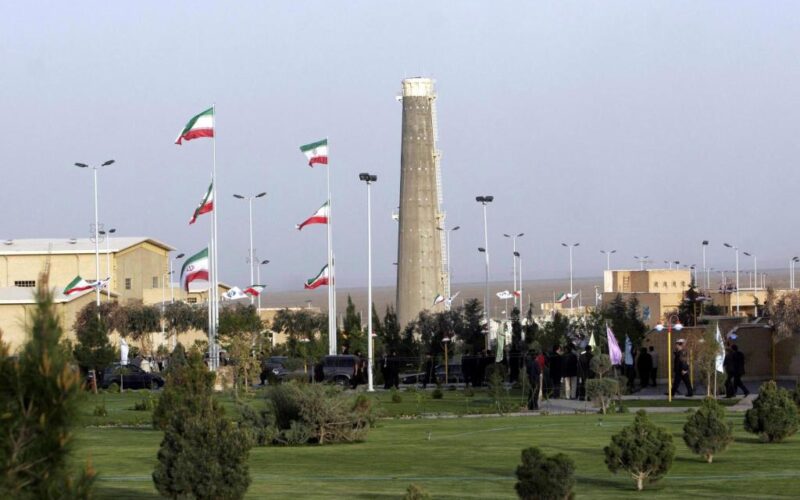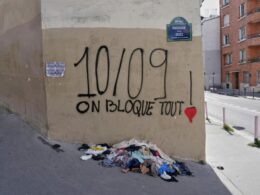Associated Press
DUBAI, United Arab Emirates (AP) — Iran’s Supreme Leader Ayatollah Ali Khamenei rejected direct negotiations with the United States over his country’s nuclear program Tuesday.
Khamenei’s remarks come as Iranian President Masoud Pezeshkian traveled to New York for the U.N. General Assembly. The comments likely will constrain Pezeshkian and halt any possible outreach to the Americans.
Khamenei gave the remarks in a speech aired on Iranian state television. They came after Iranian Foreign Minister Abbas Araghchi met with European counterparts seeking to stop the reimposition of nuclear sanctions, likely set to resume Sunday.
THIS IS A BREAKING NEWS UPDATE. AP’s earlier story follows below.
VIENNA (AP) — Senior diplomats from Germany, the United Kingdom and France were holding last minute negotiations with Iran’s Foreign Minister Abbas Araghchi on the sidelines of the U.N. General Assembly on Tuesday to explore final options before the reinstatement of sanctions on Iran’s nuclear program on Sept. 28, German Foreign Minister Johann Wadephul said.
A statement issued on behalf of Iranian Foreign Minister Abbas Araghchi acknowledged the meeting, which also involves Kaja Kallas, the foreign policy chief for the European Union.
Wadephul has said the chances of reaching a diplomatic solution before the sanctions are automatically reimposed on Sunday are “extremely slim,” according to German news agency dpa.
“Iran has been disregarding its obligations under the Vienna Nuclear Agreement for years,” Wadephul was reported as saying, referring to the nuclear deal that was concluded between Iran and world powers in Vienna in 2015.
“We have drawn the necessary consequences from this and triggered the so-called snapback mechanism, which will reinstate international sanctions against Iran at the end of this week,” he said.
Wadephul added, however, that the three European countries — known as the E3 — will continue to negotiate with Iran even after the sanctions are back.
Amid a flurry of diplomatic engagements, Araghchi on Monday also met with Rafael Grossi, director general of the International Atomic Energy Agency, in New York.
Earlier this month, the U.N. nuclear watchdog and Iran signed an agreement mediated by Egypt to pave the way for resuming cooperation, including on ways of relaunching inspections of Iran’s nuclear facilities.
On July 2, Iran’s President Masoud Pezeshkian signed a law adopted by his country’s parliament suspending all cooperation with the U.N. nuclear watchdog. That followed Israel’s 12-day war with Iran in June, during which Israel and the U.S. struck Iranian nuclear sites.
Iran has long insisted its program is peaceful, though Western nations and the IAEA assess that Tehran had an active nuclear weapons program until 2003.
France, Germany and the U.K. began the process of reimposing sanctions on Iran at the end of August.
The process — termed a “snapback” by the diplomats who negotiated it into Iran’s 2015 nuclear deal with world powers — was designed to be veto-proof at the U.N. and could take effect in a month.
The move set a 30-day clock ticking for the resumption of sanctions unless the West and Iran reach a diplomatic agreement.
European nations have said they would be willing to extend the deadline if Iran resumes direct negotiations with the U.S. over its nuclear program, allows U.N. nuclear inspectors access to its nuclear sites, and accounts for the more than 400 kilograms of highly enriched uranium the U.N. watchdog says it has.
If no diplomatic deal is found this week, the sanctions will automatically “snapback” on Sept. 28. That would again freeze Iranian assets abroad, halt arms deals with Tehran and penalize any development of Iran’s ballistic missile program, among other measures, further squeezing the country’s reeling economy.
Associated Press writers Jon Gambrell in Dubai, United Arab Emirates, and Nasser Karimi in Tehran, Iran, contributed to this report.
The Associated Press receives support for nuclear security coverage from the Carnegie Corporation of New York and Outrider Foundation. The AP is solely responsible for all content.
Additional AP coverage of the nuclear landscape: https://apnews.com/projects/the-new-nuclear-landscape/









